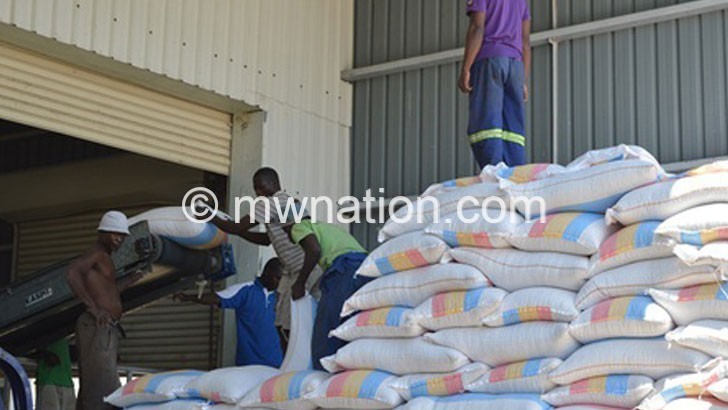Final crop estimates under lock and key
Over 1 000 agricultural technicians across the country have since May, when they concluded the agricultural production estimates survey (Apes), been withholding basic agricultural data which is used for estimating the national aggregates of crop production.
The workers, through their Agricultural Technicians Union of Malawi (Atum), are withholding the data to force their ministry to address their outstanding concerns which they claim have been neglected for many years.

Atum secretary general Adams Kwisongole on Tuesday confirmed that the union members were holding back the data and declared they would not release it until issues of their welfare are addressed.
But public relations officer in the Ministry of Agriculture and Food Security Priscilla Mateyu said in an interview yesterday that the withholding of the data would not prevent the ministry from releasing the third and final crop estimates. She said the ministry was already working on the data and the third and final production estimates would be released once finalised.
Asked to explain how the ministry is working on the data when Atum have not released it, Mateyu simply said: “On that one, no comment.”
After the survey, the workers were expected to hand over the collected primary data to the ministry through their respective Agricultural Development Divisions (ADDs), but they did not do so.
The data is supposed to be presented at least by the second week of June each year for the ministry to process and release the final crop estimates. The final crop estimates determine actual production and confirm whether the country would be food-secure at both household and national levels.
The technicians, who include extension workers and other workers from agriculture-related government departments starting from the frontline staff upwards, have following the expiry of their seven-day ultimatum to the ministry as well as that of Local Government.been on a sit-in since May 12
Kwisongole said their concerns include promotions, salary arrears dating to 2014, hardship allowances, mobility, Apes gadgets, risk allowances, trainings and personal protective equipment (PPE).
In May, the frustrated workers conducted nationwide protests before presenting their petition to authorities in Blantyre, Zomba, Lilongwe and Mzuzu, according to Kwisongole.
And last month, they also petitioned the Parliamentary Committee on Agriculture, but until today, they claim none of the issues they raised has been addressed.
Kwisongole said since they were dealing with the previous government, they have given the new government led by Lazarus Chakwera three weeks to settle in office before reviving the matter.
“So far, we have got all the data at hand but we will not give them… Last time we were told they were consulting so we are still waiting while continuing with our sit-in and all our services were already withdrawn,” he said.
An agricultural economist and development expert Tamani Nkhono-Mvula asked government to immediately reach an amicable solution on the deadlock with the technicians as the data for estimates was for the good of the agricultural sector.
He observed that the delay or absence of the data has dire effects on effective planning within the ministry and the agriculture sector as a whole.
Tamani-Nkhono said the crop estimates were a main planning tool for food security interventions because it gives stakeholders a picture of whether the country has enough food or not.
“As the budget is being developed, the data provides a basis of how much to allocate to institutions like NFRA [National Food Reserve Agency] and others involved in food security issues.
“It also helps in knowing the distribution of food within the country and this helps in designing the kind of structural interventions to be put in place to avoid hunger. They also form the baseline for Mvac [Malawi Vulnerability Assessment Committee] assessments,” he said.
Farmers Union of Malawi (FUM) president Frighton Njolomole said the situation was unfortunate, but he expressed hope that government would quickly address the concerns “because the estimates are required by all means for the benefit of the country”.
He said: “We will encourage them [government] to look into the concerns of these workers because they are quite genuine issues.
“We need to plan very well because that may also have an impact on us, as farmers, because we need information to make informed choices as we approach the next farming season.”
In its first estimates released in February this year, the ministry predicted that the country’s maize yield during the 2019/20 growing season would increase by about nine percent compared to 2018/19 farming season.
The survey indicated an increase in the country’s staple grain from 3 391 924 metric tonnes (MT) in 2018/19 to 3 691 866 MT in 2019/20 representing an 8.8 percent increase.
The ministry attributed the increase to improved uptake of inputs by farmers and favorable weather conditions which saw the country receiving good rainfall from November 2019 through to March this year.





